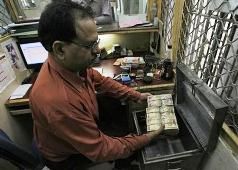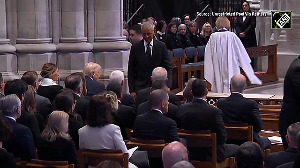 The finance ministry may not go for a quasi sovereign bond offering abroad through public sector banks.
The finance ministry may not go for a quasi sovereign bond offering abroad through public sector banks.
Rather, it is likely to ask public sector undertakings and financial institutions to raise money abroad.
“We will not go through the banking sector,” an official told Business Standard.
Officials asked what the point was in going through banks when the government has to give guarantees.
The issue is, they pointed out, the government had limited fiscal space under the Fiscal Responsibility and Budget Management Act to guarantee such bonds by banks.
This time, the job is likely to be done by an undertaking in which the government has a significant stake.
Most probably, it will be done to finance infrastructure needs.
The idea is to raise money abroad and bring forex in India. Most infrastructure needs will be met in rupees.
Therefore, forex kitty will shore up, to finance a widening current account deficit and strengthen the rupee value, the official explained.
Some companies which could fit the designated role include Power Finance Corporation, India Infrastructure Finance Company Ltd and Indian Railway Finance Corporation.
The government holds 73.72 per cent shares in PFC, which raised external commercial borrowing of $250 million in February 2013 for onward lending to firms for a maturity of four years.
IIFCL, with a 100 per cent Government
IRFC, a subsidiary of the railways, also goes for ECB to fund rolling stock assets. It had raised Rs 975 crore by ECB in 2011-12.
When asked about raising money through quasi bonds, officials said ECB could also be raised through bonds.
The comfort with these companies raising quasi sovereign bonds is that the government need not give legal guarantee, though all the support to, say, IRFC will come from the Budget.
As such, there is ‘moral’ guarantee, but not legal guarantee, because of which these companies raise ECBs at quite reasonable rates.
After RBI governor D Subbarao objected to sovereign overseas bonds, the finance ministry has junked the idea of full-fledged government bonds in foreign markets.
The government has neither issued a sovereign bond directly in the past, nor has it gone for regular issues.
The India Development Bond in 1991 was a quasi-sovereign bond, whereas the Resurgent India Bond in 1998 and Millennium India Deposit in 2000 were Nnon-resident Indian bonds.
All these were one-time issuances.
The government raised $1.6 billion, $4.8 billion and $5.5 billion, respectively, from these bonds.
Earlier, Planning Commission member Saumitra Chaudhuri had also mooted the idea of quasi sovereign bonds by public sector companies to finance infrastructure needs.



.jpg)






 © 2025
© 2025